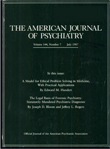Effect of Clinical Doses of Fluoxetine on Psychological Variables in Healthy Volunteers
Abstract
OBJECTIVE: The authors sought to determine the effect of clinically equivalent doses of fluoxetine on mood and other psychological variables in normal subjects. METHOD: Fifteen healthy volunteers received placebo for 2 weeks; fluoxetine, 10 mg/day, for 1 week; fluoxetine, 20 mg/day, for 5 weeks; and then an additional 2 weeks of placebo in the context of a single-blind study. The subjects were evaluated with a series of self- and observer-rated instruments. RESULTS: No significant effects attributable to fluoxetine were observed on any of the psychological variables examined. Minimal adverse effects were reported. CONCLUSIONS: Significant mood-elevating and other psychological effects of fluoxetine would appear to be induced only when symptomatic targets exist. (Am J Psychiatry 1998; 155:290–292)



